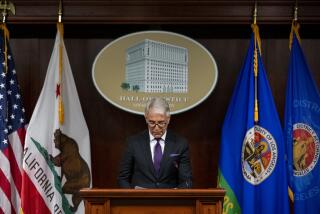He said, anonymously
- Share via
Reader Patrick Meighan of Culver City wondered about the use of an anonymous source in reporter Ken Dilanian’s Aug. 30 article about an increase in domestic surveillance since the Sept. 11 attacks. Meighan wrote:
“I enjoyed reading the piece about the massive surge in our federal executive’s oversight-free surveillance of American citizens since 9/11. However, I’m wondering why you chose to grant anonymity to the ‘senior law enforcement official’ who cited the [Najibullah] Zazi case in defense of federal eavesdropping on attorney-client communications. The assertions made by that anonymous official plainly serve the political and policy interest of the current administration, and his or her comments place that official in absolutely no personal or career jeopardy whatsoever. So why in the world would you grant anonymity to someone making such a government-serving declaration, instead of requiring him/her to speak on the record (as did every opponent of the policy in question)?”
Washington Bureau reporter Ken Dilanian responds:
You raise a thorny issue: There is too much of this in Washington. The official was not authorized to speak publicly about the details of the case, and my choice was to either accept it on background or not use the quote. I thought the quote made an interesting and important point. And contrary to what you seem to be suggesting, it’s not really a disputable point: The government did things in the Zazi case they never could have done before 9/11. The official was saying that’s a good thing — others in the story were saying it’s a bad thing.
The Times’ Ethics Guidelines say this about anonymous sources:
When we use anonymous sources, it should be to convey important information to our readers. We should not use such sources to publish material that is trivial, obvious or self-serving.
Sources should never be permitted to use the shield of anonymity to voice speculation or to make ad hominem attacks.
An unnamed source should have a compelling reason for insisting on anonymity, such as fear of retaliation, and we should state those reasons when they are relevant to what we publish.
The reporter and editor must be satisfied that the source has a sound factual basis for his or her assertions. Some sources quoted anonymously might tend to exaggerate or overreach precisely because they will not be named.
We should identify sources as completely as possible, consistent with the promise of anonymity. In particular, a source’s point of view and potential biases should be disclosed as fully as possible. For instance, “an advisor to Democratic members of the House Foreign Affairs Committee” is preferable to “a congressional source.”
More to Read
A cure for the common opinion
Get thought-provoking perspectives with our weekly newsletter.
You may occasionally receive promotional content from the Los Angeles Times.









